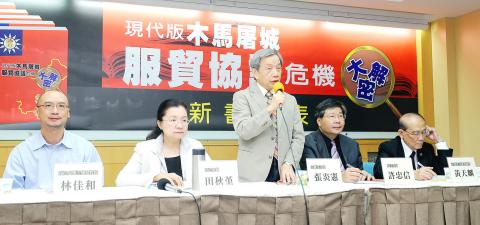The cross-strait service trade agreement is part of President Ma Ying-jeou’s (馬英九) “triangle policy” toward eventual unification with China and should not have been signed, a pro-independence advocacy group said yesterday.
“We believe that the agreement, along with the ‘one China’ principle, and a meeting between Ma and Chinese President Xi Jinping (習近平), form a triangle policy of Ma’s goal of eventual unification,” former presidential advisor Huang Tien-ling (黃天麟) wrote in a booklet published by the Taiwan Society.
A collection of several academic works, the booklet titled Crisis of the service trade agreement — a modern-day Trojan horse was officially launched yesterday at a press conference.

Photo: Wang Min-wei, Taipei Times
Breaking down the agreement into how it affects the economy, society, national security, democracy and institutionalized negotiations, the authors conclude that the pact is more of a political agreement than an economic one.
The cross-strait service trade agreement, which was signed in June, has touched upon the core aspect of the nation’s industries under the common market structure laid out in the Economic Cooperation Framework Agreement (ECFA) signed in 2009, and it could further tie the nation’s economy to the Chinese economy and have a devastating effect on small and medium-sized businesses, Huang said.
“Beijing’s strategy of reunification by trade is an open secret, which is why discussion of the agreement without a political deliberation would be foolish,” Huang said.
The agreement, which is due to be screened clause-by-clause in the legislature, was controversial due to the opaque way it was signed and the scale of its negative impacts on various local sectors of the service industry, in particular banking, retail and agriculture.
Closer cross-strait banking integration could cause a financial crisis if loans to Chinese end up as bad debts, National Taipei University professor Wang To-far (王塗發) told the press conference.
Once the trade in goods agreement is signed by the end of this year, Chinese investors would be able to dictate Taiwan’s retail market and integrate supply, wholesale and retail, retired National Taiwan University professor Kenneth Lin (林向愷) said.
The agricultural sector would face the same situation if the current ban on certain Chinese agricultural products is lifted, Lin added.

Alain Robert, known as the "French Spider-Man," praised Alex Honnold as exceptionally well-prepared after the US climber completed a free solo ascent of Taipei 101 yesterday. Robert said Honnold's ascent of the 508m-tall skyscraper in just more than one-and-a-half hours without using safety ropes or equipment was a remarkable achievement. "This is my life," he said in an interview conducted in French, adding that he liked the feeling of being "on the edge of danger." The 63-year-old Frenchman climbed Taipei 101 using ropes in December 2004, taking about four hours to reach the top. On a one-to-10 scale of difficulty, Robert said Taipei 101

Taiwanese and US defense groups are collaborating to introduce deployable, semi-autonomous manufacturing systems for drones and components in a boost to the nation’s supply chain resilience. Taiwan’s G-Tech Optroelectronics Corp subsidiary GTOC and the US’ Aerkomm Inc on Friday announced an agreement with fellow US-based Firestorm Lab to adopt the latter’s xCell, a technology featuring 3D printers fitted in 6.1m container units. The systems enable aerial platforms and parts to be produced in high volumes from dispersed nodes capable of rapid redeployment, to minimize the risk of enemy strikes and to meet field requirements, they said. Firestorm chief technology officer Ian Muceus said

MORE FALL: An investigation into one of Xi’s key cronies, part of a broader ‘anti-corruption’ drive, indicates that he might have a deep distrust in the military, an expert said China’s latest military purge underscores systemic risks in its shift from collective leadership to sole rule under Chinese President Xi Jinping (習近平), and could disrupt its chain of command and military capabilities, a national security official said yesterday. If decisionmaking within the Chinese Communist Party has become “irrational” under one-man rule, the Taiwan Strait and the regional situation must be approached with extreme caution, given unforeseen risks, they added. The anonymous official made the remarks as China’s Central Military Commission Vice Chairman Zhang Youxia (張又俠) and Joint Staff Department Chief of Staff Liu Zhenli (劉振立) were reportedly being investigated for suspected “serious

Nipah virus infection is to be officially listed as a category 5 notifiable infectious disease in Taiwan in March, while clinical treatment guidelines are being formulated, the Centers for Disease Control (CDC) said yesterday. With Nipah infections being reported in other countries and considering its relatively high fatality rate, the centers on Jan. 16 announced that it would be listed as a notifiable infectious disease to bolster the nation’s systematic early warning system and increase public awareness, the CDC said. Bangladesh reported four fatal cases last year in separate districts, with three linked to raw date palm sap consumption, CDC Epidemic Intelligence